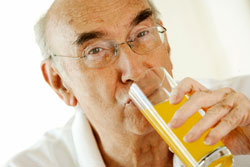
Older people should all aim to have at least 8 drinks a day.
What is dehydration?
Water makes up two-thirds of our body. It is vital we drink enough fluid to maintain a healthy balance. Most people get dehydrated by not drinking enough fluids or by losing fluids and not replacing them.
Who is at high risk?
- those who are dependent on others for access to fluids
- if you have swallowing problems
- if you have a raised temperature
- if you have diarrhoea and/or vomiting
- after you have taken part in strenuous exercise
Spotting the signs and symptoms:
- drinking less than usual (feeling thirsty)
- dark-coloured or small amounts of urine
- headaches
- tiredness
- dry mouth, lips or eyes
- lack of concentration
- confusion
- constipation
- urinary tract infections
What to do if you are concerned about someone yourself or someone you know
You can help prevent dehydration in yourself or others by:
- recognising the early warning signs
- planning visits around mealtimes to get a sense of what they are drinking and if they have any difficulties drinking
- sitting down and having a cup of tea socially or with relatives or friends
- encouraging around 8 drinks per day such as after each meal and snack time
- ensuring both hot and cold drinks are safely and freely accessible
- encouraging foods which are high in fluid content such as ice cream, lollies, jellies, nourishing soups or water rich fruits such as melons
Good hydration can prevent or treat:
- headaches
- urinary tract infections
- constipation
- dizziness leading to falls
- memory loss and confusion
- kidney stones
- poor oral health
- pressure ulcers or skin conditions
What should I drink?
Aim for at least 8 drinks per day.
Any fluid, except alcohol counts including milk, water, tea, coffee and fruit juice.